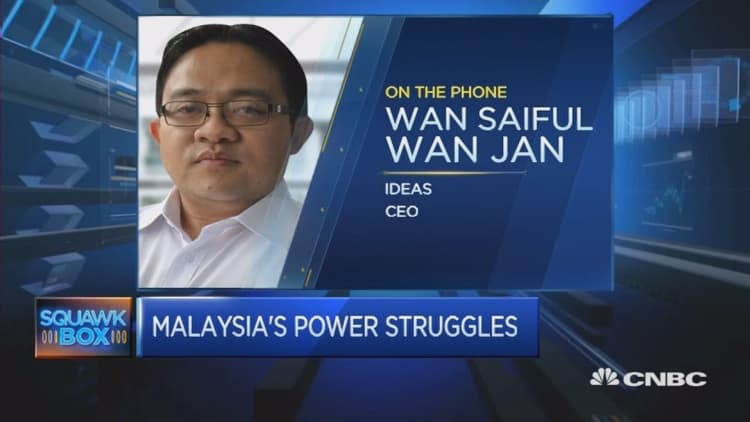
In most countries, reports of $1 billion of unknown providence landing in a prime minister's personal bank account would likely herald a change at the top.
But Malaysia's Prime Minister Najib Razak looks set to keep his grip on power despite unprecedented political opposition, analysts said.
The opposition to Najib took a high-profile step Friday when Malaysia's iconic former leader Mahathir Mohamad, who was prime minister from 1981-2003, joined members of both opposition and ruling parties to sign a declaration calling for Najib's removal.
Reuters also reported that opposition leader Anwar Ibrahim, who Mahathir removed as deputy prime minister in 1998, issued a statement from jail saying that he supported the push to remove Najib. If Najib is allowed to remain in power, the damage from the scandal related to the deeply indebted state fund 1Malaysia Development Berhad (1MDB) will become worse, Mahathir said Friday.
The declaration was a shot across the bow.
"The fact that Mahathir and the other opposition leaders are banding together to put more pressure on Najib to resign is unprecedented," Wan Saiful Wan Jan, chief executive at the self-described cross-partisan think tank Institute for Democracy and Economic Affairs (IDEAS) in Malaysia, told CNBC's Squawk Box. "No one could have expected that Mahathir would be willing to sit down with his foes."
The scandal driving the opposition has run for months.
Najib has been under pressure since the Wall Street Journal published a report in July alleging that nearly $700 million had flowed from 1MDB to Najib's personal bank account.
Najib has repeatedly denied wrong-doing and, under pressure from the WSJ report, said at the time the funds were a private donation from a Middle Eastern country he declined to name. In January, Malaysia's Attorney General Mohamed Apandi Ali told an unscheduled press conference that Saudi Arabia's royal family gave Najib a $681 million gift that was subsequently partially returned.
Apandi said at the same press conference that no criminal offense had been committed, but investigators are continuing to probe the allegations in other countries, including Switzerland, which said it had found misappropriation of around $4 billion from Malaysian state companies. Singapore has also said it has seized several bank accounts in recent months as part of its investigation into possible money-laundering related to 1MDB.
Despite the accusations, Wan Saiful has doubts that the movement will be successful.
"Whether or not Najib steps down depends on him and on UNMO (United Malays National Organization)," he said, referring to the ruling party, which has been in power since the country's first election in 1959. "If UNMO does not put pressure from inside for Najib to resign and if he himself does not want to resign, he doesn't have to resign."
Indeed, in a statement Friday, a Malaysian government spokesperson said, "If Tun Mahathir wants to change the government, he must follow democratic process and await the next election, in line with Malaysia's laws and federal constitution."
Others also expect any attempt to get rid of Najib will face a hard slog.
"Opponents within and outside UMNO are being crippled or threatened one-by-one," Yang Razali Kassim, a senior fellow at Singapore's S. Rajaratnam School of International Studies (RSIS), said in a commentary note dated Monday.
It's not just political maneuvering that may keep Najib in power.
IDEAS' Wan Saiful even noted that business interests may not want Najib pushed out.
"What businesses are looking for is stability, and I'm sorry to say this, but they're not necessarily looking for good governance," he said. "Many people are saying the other side, whoever takes over from Najib, would turn the situation to be more unstable."
But it's not at all clear-cut that Najib's position is secure.
While Najib's "hardcore" supporters have dismissed Mahathir's strategy, "any misplaced sense of supreme confidence on the part of UMNO could, however, backfire," RSIS' Yang said.
Yang believes that if elections were held today, UMNO and the coalition it leads, Barisan Nasional (BN), could lose.
"If Mahathir and his citizens' movement could sustain themselves and grow, and the opposition recovers from its disunity - all climaxing towards the next general election to be called by 2018 - UMNO and BN could be in deep trouble," Yang said.
The country may also turn away from Najib out of simple fatigue.
"This is a big distraction to governing the country," Wan Saiful said. After Mahathir's press conference, "I was really thinking if anything else, the people in Najib's camp should consider the fact that this has become a distraction and maybe it is the time to call it a day and let the country move on."
Najib's office didn't immediately return an email seeking comment.
Follow CNBC International on Twitter and Facebook.
—By CNBC.Com's Leslie Shaffer; Follow her on Twitter @LeslieShaffer1




